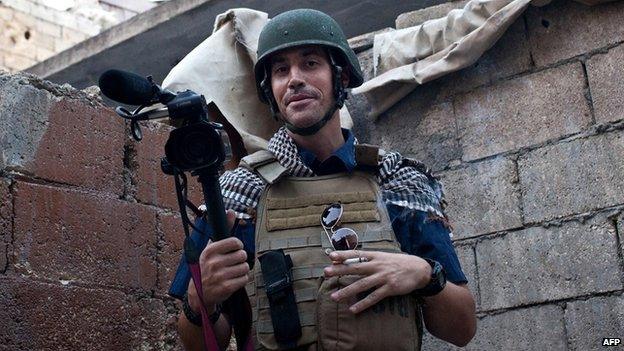Help identify 'aspiring terrorists' - Scotland Yard
- Published

AC Rowley said "every reasonable person" had been touched by Mr Foley's "pitiless" murder
The UK's head of counter-terrorism has appealed to the public to help identify people who have travelled to Syria or are showing signs of being radicalised.
Assistant Commissioner Mark Rowley made his appeal after the murder of US journalist James Foley in Syria.
"Significant progress" has been made towards identifying an Islamic State militant with an English accent seen in a video of the killing, said AC Rowley.
Counter-terrorism arrests are running at five times last year's levels.
This is because of the threat posed by would-be jihadists travelling to and from Syria, said AC Rowley of the Metropolitan Police, the National Policing Lead for Counter Terrorism.
He also described the growth in numbers of dangerous individuals as challenging, as nearly half of those going to Syria were not previously known as being potential terrorists.
London and the West Midlands have seen the biggest growth in Syria-related investigations.
Ten people a month are being stopped from travelling out to Syria or Iraq by being referred to the government's anti-terrorism Prevent programme, which targets individuals who are at risk of being radicalised.
Assistant Commissioner Mark Rowley appealed for anyone with information about James Foley's killer to come forward
AC Rowley said: "We are appealing to the public, family members and friends to help identify aspiring terrorists.
"They may be about to travel abroad, have just returned or be showing signs of becoming radicalised."
He asked for people to watch out for any suspicious change in behaviour, such as selling their possessions or raising money to travel abroad.
AC Rowley said progress was being made in the investigation to find the man seen in the video that showed the moments before and after the apparent beheading of 40-year-old Mr Foley, but would not go into further details.
He said: "Every reasonable person in the country has been touched by the pitiless murder of James Foley at the hands of Islamic State terrorists, and the murderer's apparent British nationality has focused attention on extremism in the UK as well as the Middle East."
'Warped narratives'
Addressing the rise in arrests, he said that in the first six months of this year, 69 suspected extremists who planned to travel to Syria or fund terrorism there were arrested.
He added: "High priority operations, especially against those involved in attack planning or on the cusp have increased greatly.
"Port stops, and cash seizures have grown by over 50% as we strive to disrupt terrorists."
Scotland Yard is removing about 800 pieces of terrorist content linked to Syria and Iraq removed from websites including YouTube, Facebook and Twitter.
In the last four years, more than 40,000 pieces of extremist content has been taken down.
"There is a lot at stake," said AC Rowley. "In addition to the public assistance in identifying potential terrorists we all need community and religious leaders to continue to speak out against warped narratives and we need everyone to ensure that public debate does not give oxygen to the terrorists by giving them the publicity they seek."
'Generational struggle'
Earlier, the prime minister's spokeswoman said the threat posed by Britons fighting with IS militants would be a "generational struggle".
People who went to Syria and Iraq would be investigated by police, she added.
The spokeswoman had no comment to make on progress in efforts to identify the masked man who appears in the footage, which shows the moments before and after the apparent beheading of the 40-year-old.
The Foreign Office and Home Office have so far refused to comment on remarks by Britain's ambassador to the US that the UK is close to identifying the suspected British jihadist.
Meanwhile, the Muslim Council of Britain's deputy secretary general has said the Prevent strategy is having a "negative impact".
The scheme seeks to lessen the influence of extremism but Harun Khan told BBC Radio 5 live it alienated young Muslims and pushed them towards radical groups.
Prevent, which is part of the government's broader counter-terrorism strategy, external, aims to "stop people becoming terrorists or supporting terrorism".